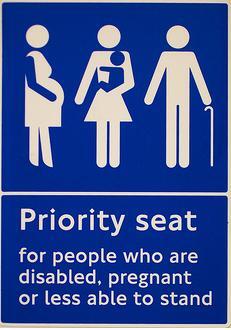-
PRIORITY SEATS SHOULD NOT BE IGNORED! #lookupgetupFor too long priority signage has been ignored. Pregnant women are left to stand, disabled people are ignored, young children get squashed and the elderly shown little consideration. Priority seat users shouldn't have to ask. LET'S DO IT TOGETHER! #lookupgetup is aimed at making sure we all take social responsibility to ensure priority seats are available for those that need them. Together we're pledging not to fall asleep, continually look at something VERY important on our phones or bury our heads in a newspaper. Instead, if we're sat in a priority seat, we will look up regularly and offer up the seat as soon as we see someone who might need it more. If you're worried about embarrassing yourself, just don't sit there. WHAT ELSE? In exchange I will contact transport providers, starting with TFL, asking them to provide better signage and promote awareness. Let's try and crack this - we have no problem telling people to stand on the right of escalators, why should this be any different? SPREAD THE WORD! If you see or know of anyone who qualifies for a priority seat and has been ignored, please tell them about this campaign!262 of 300 SignaturesCreated by Kait Borsay
-
Muirfield Golf Club: tee'd offIt's 98 years since (some) women were allowed to vote in Britain, and 214 years since A Vindication of the Rights of Woman was published. Muirfield Golf Club needs to get up-to-date. Treating all human beings as equal is a mark of civilisation.1,663 of 2,000 SignaturesCreated by Julie Watt
-
Give everyone in safe houses the right to vote.I have found it impossible to register to vote as I live in a Safe House in Bristol. With the local elections happening right now, and the EU referendum coming up, I'm left without a vote, without a voice, without a say on local Councillor appointment, City Mayor, the Police Crime Commissioner position or whether we stay in or out of the EU. My struggle to register made me realise this is a huge issue that no one even realises. As I live in a safe house it is vital for my safety that my name and address do not appear on the electoral register. The current system does provide an 'anonymous registration' process designed to protect vulnerable or at risk people who can't disclose their residential address. However this form requires evidenced approval through proven Court Injunction, written signature from a Police Superintendent or Adult Social Services management. For many in my situation, (estimated at 70% of all residents in Bristol safe houses by support staff here) their registration would not be eligible for sign off. Taking away the civil right, human right that was fought so hard for back in 1918 that introduced the 'Representation of the People Act' allowing women the right to vote. Across England there are over 250 independent refuges providing safe emergency accommodation for people fleeing domestic abuse. Thousands of people living in secure residential accommodation where location secrecy is of utmost importance. Thousands of people who will not be able to register to vote. That is a huge number of women being denied basic Human Rights. The Human Rights Act (1998) states "it is unlawful for public authority to act in a way which is incompatible with European Convention right". Safe houses and refuges by their very nature ensure all residents staying with them are in need of safety and security after leaving abuse. Therefore having management level able to sign the anonymous registration form is more than enough evidence for each residents need for anonymity. Such a simple solution for such an important change that needs to be made. Please sign and share this petition so we can no longer be kept in silence. Thank you.22,718 of 25,000 SignaturesCreated by Mehala Osborne
-
Remove the exclusion of ostomy patients from the Blue Badge schemeCurrently those with colinic/bowel disorders and who have a permanent condition as a result of this are rejected from the Blue Badge scheme. Granted that this is true of many others as well, but ostomates usually have to carry with them a set of spares (from clothing to appliances) and having easy and close access to these would be a huge relief, especially in an emergency. Believe me, walking through a supermarket car park knowing that you clothes are soiled is not pleasant, and being able to be back at the car and safety would be a huge physical and psychological benefit. Likewise, many ostomates end up with hernias as a result of their surgery, meaning that carrying heavy items and distance can be challenging if not actually harmful, let alone the issues of having to stack/pack these into a boot or onto a back seat. There are over 100,000 ostomates in the UK currently who have to fend for themselves (I speak as one of these). Seeing others abuse the scheme of course makes one think that it should be tightened, but not to the exclusion of those with genuine needs.1,983 of 2,000 SignaturesCreated by Nigel Ashton
-
Broadcast equality for England's women national football teamFollowing the overwhelming success of England’s women at the 2015 FIFA Women’s World Cup in Canada last year – with semi-final viewing figures peaking at 2.4 million on the BBC despite an 11pm kick-off, and with the third-place playoff victory against Germany drawing a peak of 2.5 million viewers despite a 10pm kick-off – it's time that our women get equal broadcast coverage on free-to-air television as their male counterparts. Given that the women took England to their highest finish in a World Cup competition since the men won in 1966, we should be celebrating their sporting achievement, and the massive rise in popularity in women's football, both professional and at grassroots level, over the past decade.165 of 200 SignaturesCreated by Will Calcutt
-
Investigate and prosecute Government officials involved with Mossack FonseccaTax evasion has been estimated to cost the UK between £34bn to upwards of £100bn a year, this is money that is being stolen from our NHS, Schools and other public services. We jail single mothers for fraudulently claiming benefits for amounts that are insignificant by comparison to the people using these tax dodging schemes. The law should be fairly applied to all in society, regardless of their status or wealth.157 of 200 SignaturesCreated by Aaron Flannagan
-
Humans Before Houses - Build the link road firstWe the undersigned hereby call on all at Teignbridge District Council - district councillors; Simon Thornley, Ian Perry, and the other planning officers; Nicola Bulbeck, the chief executive officer; and Cllr Jeremy Christophers, the council leader - to put the safety of human lives in Dawlish first, before any further houses are built in the DA2 development. The three separate developers involved in Teignbridge District Council’s DA2 draft framework agreement, planning to build over 1000 new houses on adjoining land plots, are permitted to build and sell 50 houses each on their 3 separate developments, before Teignbridge considers it necessary to start to build the link road, from the Gatehouse Farm housing development, over the Shutterton Brook, through the Secmaton Farm housing development, and to the roundabout at Sainsburys to join the A379. Until then, Teignbridge District Council think it is acceptable to have all the construction traffic over residential roads such as Elm Grove Drive and Sandy Lane. With this logic, the people of Dawlish would be required to wait for 150 houses to be built, sold, and inhabited, before the new road is started. 150 houses will not appear overnight, so the people of Dawlish, especially: - residents on Elm Grove Road, Elm Grove Drive, and Sandy Lane; children attending the Gatehouse primary school, Dawlish Community College, Red Rock Youth Centre, and Dawlish United Youth Football and Mini Soccer FC; and people attending the leisure centre and playing fields - would have to endure many months of colossal amounts of heavily laden construction trucks, contractors’ vans, noise, extra traffic, and pot holes. These residential roads are not designed and built to endure months and years of heavy vehicles. Indeed they are already crumbling with numerous pot holes. We call on Teignbridge District Council to show the people of Dawlish the respect that is shown to Newton Abbot and Teignmouth, and to find the funds to build a service road for construction vehicles to use before any further building in the DA2 area developments. These funds will be repaid by the developers as they build the houses. If Teignbridge District Council can find in its reserves £13 million for a new shopping centre in Newton Abbot, and £2.5 million towards the Pavilions in Teignmouth, then the cost can surely be found to build a ‘base core’ service link road to be built before the construction of 150 new houses begins. Devon County Council has already agreed to funding the main bridge costs. The people of Dawlish should not have to wait for a fatality to happen on our streets before Teignbridge District Council realises that human lives are worth a whole lot more than 150 houses.737 of 800 SignaturesCreated by Cllr Alison Foden
-
Stop the Alienation of GrandparentsAre you afraid of being cut off from your grandchildren? If so, you’re not alone. Grandparent alienation is a problem affecting families across the country. Losing access to a grandchild can be devastating. There should be a law against parents who refuse to allow grandchildren and grandparents to have contact. It is extremely harmful to the child when they have had a good relationship with grandparents. I used to have my 2 grandchildren most weekends but since the breakup of the parents the mother will no longer allow us contact. The only people that suffer are the children in the long run. Stop the Alienation NOW122 of 200 SignaturesCreated by Caroline Wilson
-
Equalise the minimum wageThis campaign is important for multiple reasons, firstly it is unfair practice and a form of ageism to pay 18-20 year olds less than their 21+ year old counterparts for the same work, secondly young people are disadvantaged by low pay as it is working for lower wages means having to work longer hours for the same of money which can have a negative effect on commitments to education, family duties and a good work life balance and finally this campaign is important to highlight that young people are an equal and respect member of the work force.12 of 100 SignaturesCreated by Josh McCormick
-
Stop Freezing Overseas State PensionsThe continued exclusion of overseas pensioners from up-rating adjustments to their State Pensions means that the real terms incomes of those affected falls year-on-year. Over time this leads to hardship, poverty, loss of independence and loneliness. Some individuals have been forced to return to the UK, away from loved ones, just to get by. This policy also creates a barrier to pensioner emigration from the UK, as the prospect of a frozen pension means that many feel they simply couldn't afford to do so. Given the countries involved are largely in the Commonwealth, those in British Black, Asian and Minority Ethnic communities are disproportionately impacted. There is no dispute about the entitlement to receive a State Pension overseas. All British pensioners who have made the required NI contributions during their working life are eligible. The issue at stake is whether that pension is universally uprated or not. At the moment, the government's policy is inconsistent and unfair, with half British pensioners abroad getting up-rated and the other half excluded. This creates crazy anomalies i.e. uprating in the USA, frozen pensions in Canada. It is time for reform to give all pensioners the full state pension they deserve, wherever they live, and to end this injustice once and for all. A positive, and easily affordable, step forward would be for the Government to include all pensioners in the 2.7% State Pension up-rating to be granted this year, by withdrawing the Social Security Benefits Up-rating Regulations 2016 currently before parliament. CASE STUDIES: Anne Puckridge Former college lecturer Anne Puckridge, now 91, lived and worked in the UK all her working life, paying mandatory NI contributions throughout this time. In 2002, aged 77 she finally retired and decided to move to Canada to be with her daughter and grandchildren who had moved to Calgary in the 1990s. Fourteen years on, Anne, who served as an intelligence officer in the Women’s Royal Navy in the Second World War, is struggling to live on the frozen £75.50 a week rate, she was entitled to when she moved abroad. Anne now feels that she will be forced to move back to Britain, because her pension will no longer cover day to day expenses and she is increasingly reliant on her daughter to get by. Anne says: “It’s the small things, and the injustice, that is really getting to me. I value my independence, but I can’t go on living on the breadline and I don’t want to inflict this on my family. As well as ever-increasingly poverty, I feel a sense of stress and shame, which is affecting my health.” Abhik Bonnerjee Abhik Bonnerjee, now 73, moved from India to Glasgow in 1960. He worked in the UK for 38 years, in shipbuilding, steel manufacture and the food industry. He owned an Indian restaurant for 6 years. Abhik returned to India in 1997 and reached the State Pension retirement age in 2008 when it was paid at £87.30 a week. Having made all the required NI contributions, if Abhik still in the UK today he would get £115.95, 28% more. The decline in his real terms income has left Abhik concerned about losing his home. He now feels he may have to move back to the UK. Abhik says: “The current situation makes me very, very angry. The government are scaremongering… [The Minister] says it will cost a lot of money but it is only a tiny percentage [of the pensions budget]. The government should be doing more, especially for Commonwealth countries and MPs can’t explain why they are not.” Rita Young Rita Young, 78, lives in Peterborough in the UK. She retired in 2002, aged 67, having enjoyed a long career in market research and as a community volunteer. Rita’s son moved to work in Australia some time ago and now has a family there. Since being widowed Rita has wanted to join her son and grandchildren in Australia, but has felt unable to do so due to the prospect of a frozen pension. As she gets older Rita finds daily life increasingly difficult, especially as she doesn’t have a family around who she can call on. She is deeply saddened that she is not able to be with her family during the later stages of her life, and feels that it is a complete injustice that had her son moved to a different country (e.g. France or the USA) she would be able join him with a full UK pension. Rita has spoken at the National Pensioners Convention about the issue and is very active in her community. Rita says: “I worked and contributed to my State Pension all my life. It doesn't seem fair that the government can just stop uprating it because I want to be with my family.” Geoff Amatt Geoff Amatt from Abergele in Wales reached 100 last year. Geoff contributed to the UK economy all his life and fought for his country during the Second World War. Geoff’s daughter Jean emigrated to Calgary, Canada more than 40 years ago, yet Geoff was unable to follow in the knowledge that his State Pension would be frozen at the rate of leaving the country. £29 per week at the time. As a result Geoff has been separated from his two grandchildren and two great grandchildren throughout his retirement. He has lived alone, largely dependent on the state for care, since his wife died seven years ago. Jean says: “Frozen pensions are unbelievably unfair. Canadians get their pension uprated in they live in the UK yet we don’t offer the same for those moving in the other direction. The government is keeping families apart and I worry about my father left all alone in Britain while we’re thousands of miles away.”3,214 of 4,000 SignaturesCreated by Tim Snowball
-
End the gender bias in autism diagnosis - girls matter tooBeing a parent of a beautiful child that is currently going through this process I understand the complexities that arise from having a child that has different needs. It not only affects the individual but the whole family as a unit. Research tells us that THOUSANDS of young girls are getting misdiagnosed or underdiagnosed due to a lack of awareness and MALE BIASED assessments. Meanwhile this leaves the families crying out for help and more importantly our children suffering unnecessary anxiety, stress and a low quality of life. As a parent all we want is for our children to be safe, healthy and happy. Our children have a right to a fair assessment and service.The whole autism process is way too complicated, frustrating, inconsistent and can take years to attain a diagnosis. No diagnosis no help. Individuals with autism are NINE times more likely to die prematurely, with suicide being the principal cause. This figure could potentially be a lot HIGHER if girls are getting missed. Many girls will have either have been dismissed as a problem child or driven by their overwhelming anxiety and depression into an already underfunded mental health service. We as a society always focus on our physical wellbeing, yet both emotional and physical walk hand in hand. There is an urgent need for the government to address this GENDER BIAS and ensure ALL KEY PROFESSIONALS across the UK are trained and made aware of the differences. Additionally ALL AUTISM SCREENING TOOLS need to include the subtle autistic traits of girls to ensure fairness and consistency. Awareness, early diagnosis and intervention is all that is needed to help our children. Please sign this life changing petition to ensure that no female child or adult gets overlooked or misdiagnosed and suffer unnecessarily. http://network.autism.org.uk/knowledge/insight-opinion/interview-dr-judith-gould-women-and-girls http://www.tandfonline.com/doi/pdf/10.1080/15332985.2015.1031858 http://autismwomensnetwork.org/autistic-women-misdiagnosis-and-the-importance-of-getting-it-right/ http://www.iancommunity.org/cs/simons_simplex_community/autism_in_girls http://www.theguardian.com/social-care-network/2016/apr/05/autism-learning-disability-premature-mortality614 of 800 SignaturesCreated by Nicola Heady
-
3 Fee Waivers for refugee studentsThe current refugee crisis is the largest humanitarian disaster facing Europe since World War 2. Over 11 Million Syrians have been unsettled and were forced to flee. Once Syrian Students have managed to claim refugee status in the UK, they face dramatic barriers to enter university, as they cannot access student loans and suffer from financial restraint. Generations of students miss out on valuable education to rebuild their future and contribute to society. Our university is rightly proud to host an increasing international student body. Our Human Rights Center has been praised as one of the leading institutions of its kind. We would like to see the university act in a humanitarian way and find ways to support the refugees. Other universities are starting to play their part: “Four UK universities (UEL, York, Warwick and Sussex) were offering scholarships to refugees. Since then a number of other universities have announced their scholarship and bursary schemes for refugees, including University of Edinburgh, Salford, SOAS, Newman and Sheffield.” In total, more than 26 universities have pledged to support refugee students to study at their universities. Let us join in this proud number: This is a petition BY students, FOR students. We want everyone to fully enjoy their right to education, regardless of the conflicts raging on in the world. Please consider this petition so we can contribute to the humanitarian disaster in what we do best: education.391 of 400 SignaturesCreated by Nele Schuldt
Hello! We use cookies to improve your experience by providing insights into how the site is being used. Find out more.












